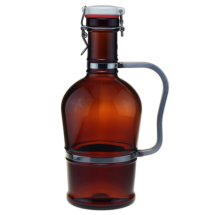Law Offices of John Connell, P.C.: The Massachusetts’ legislature is currently trying to clarify the issue of whether Massachusetts’ farmer-brewers and brewpubs may fill growlers purchased at other breweries or provided by their consumers on their own. Currently in Massachusetts, farmer brewers and pub breweries are prohibited as a matter of ABCC policy from filling any growler that does not contain that manufacturer’s brand label and the federally required label information required on such labels.
Specifically, in Massachusetts, 204 CMR 2.06(1) requires “[e]very manufacturer licensed by the [ABCC] shall place on the brand labels all information required by federal regulations.” 204 CMR 2.07 further states that, “[t]he substitution of any alcoholic beverages of a kind or brand from that ordered by a purchaser is prohibited unless it is done with the consent of the person or licensee making the purchase.” In short, you cannot bring a bottle with one beer’s label on it to another beer manufacturer and have it filled up with the other manufacturer’s beer.
Recently, a bill was introduced to amend Massachusetts General Laws Chapter 138 Section 19(c)-(d) that would allow consumers to provide their own reusable growlers for fill up at licensed brewpub and farmer-brewers provided regardless of whether the growler was purchased provided the growler is to hold malt beverages. The relevant section of the proposed legislation states as follows:
“Notwithstanding any provision of this chapter to the contrary, a farmer brewer shall be permitted to fill empty growlers, provided by consumers for retail sale, if said growler was purchased for the purpose of holding malt beverages.”
Under current law, there is no Massachusetts law that specifically prohibits the practice of using other breweries’ growlers or those otherwise provided by the customer, but the ABCC had considered this to be not in compliance with Massachusetts’ labeling requirements that require labeling compliance with federal laws. In general, federal labeling law with respect to beer manufacturers requires manufacturers to apply their brand name, place of manufacture, ingredients and certain health warnings to beer it “bottles” and sells at retail.
When it comes to so-called growlers, however, the TTB interpreting federal law makes a distinction between growlers that are pre-filled and sealed (so-called “Bottle Growlers”), and growlers that are filled on the brewery premises at the specific request of a consumer in the consumer’s presence (so-called “Glass Growlers”). A “Bottle Growler,” specifically, is a container filled on the brewery premises or brewpub by the brewer in advance of sale, sealed and offered for sale for off premises consumption. These types of prefilled growlers are subject to the federal labeling requirements of 27 CFR Part 16 and 27 CFR Part 25. A “Glass Growler,” however, is a container no different in shape or size from a “Bottle Growler” that is filled from a tap on the brewery or pub brewery premises, in front of the consumer ordering it and is not subject to federal labeling requirements.
The distinction between a “Bottle Growler” and a “Glass Growler” is also partially tax driven. For example, the TTB considers the following distinctions between filling growlers that then determines whether the manufacturer’s labeling is required:
- If the brewer fills a bottle on the brewery premises, the tax is determined upon removal for consumption of sale. Since the growler is considered a bottle, the tax is determined by its stated net contents.
- If the brewer fills a glass on the brewpub premises, the brewer must fill it from a glass that is tax determined.
The distinction between when and how the growler is poured determines whether the container requires a label under federal law, not whether the growler is then taken off premises or not. The TTB defers to the various states to determine whether “Glass Growler” is than subject to further restrictions, but Massachusetts has apparently never addressed the issue head on prior to the introduction of the new proposed amendment to G.L. c. 138 as stated above.
In Massachusetts, as there is no specific law addressing this issue, but rather a deferment to federal law with respect to labeling requirements, the proposed legislation as set forth above would go a long way towards clarifying whether a consumer can have their growler filled at a local farmer brewery or pub brewery without having to purchase a properly labeled growler from the manufacturer that fills up the growler.
Advocates of the proposed legislation argue that, as a result of the law’s ambiguous language, consumers are left with a cost-savings advantage by eliminating the burden of having to purchase a different vessel at every different brewery the fill up from. Conversely, however, this ambiguity could potentially be to the detriment of breweries regarding generating revenue from vessel purchase, as well as protecting the authenticity of their brand without mandatory purchase of vessels with the proper label relevant to their product.
2015© Law Offices of John P. Connell, P.C.
Contributed by Mandy Driscoll

